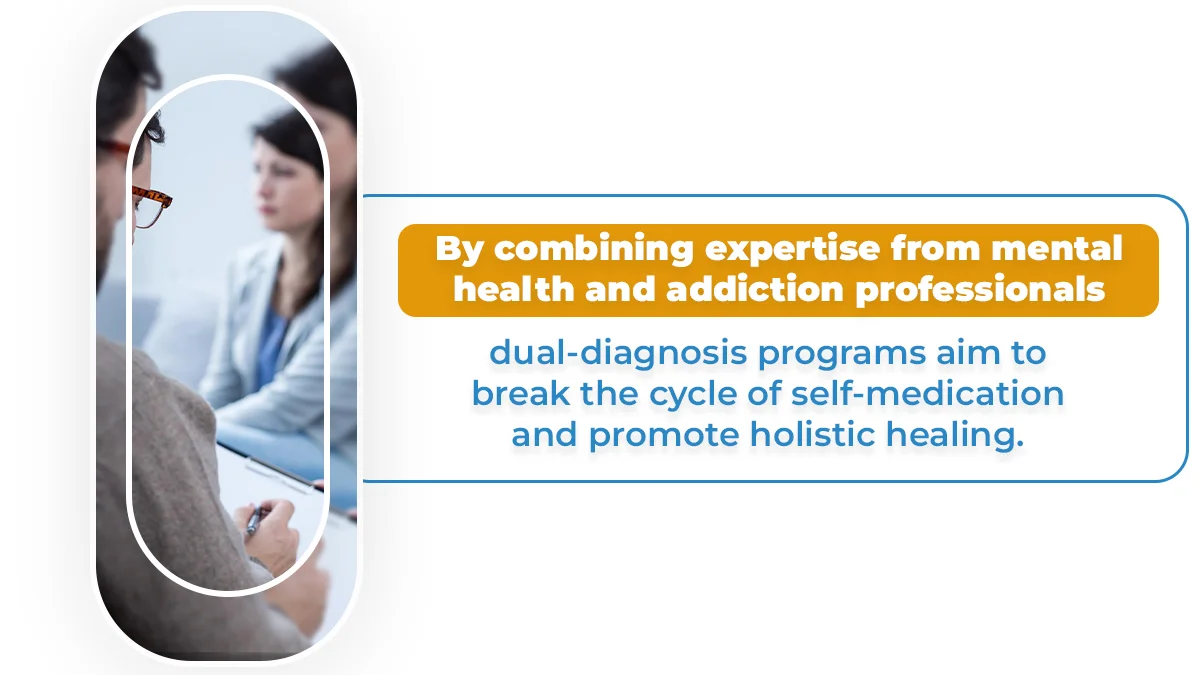Dual-Diagnosis Treatment: Holistic Addiction Care
The pinnacle of integrated care is dual diagnosis treatment, which addresses the interplay between substance abuse and mental health disorders. With a dedicated team of experts, cutting-edge therapies, and a compassionate approach, The Recovery Team-Newton is committed to guiding individuals toward lasting recovery and mental well-being.
Key Takeaways
Early intervention and prevention efforts can help reduce the risk of developing co-occurring disorders. Here’s what you need to know about dual diagnosis treatment:
- Addiction and mental health disorders can overlap or mimic each other, making it necessary to treat both conditions simultaneously.
- Integrated addiction care offers better outcomes than detox alone.
- Massachusetts’s dual diagnosis treatment encompasses personalized plans, peer support, and long-term strategies to address the complex needs of individuals with co-occurring conditions.
Call The Recovery Team-Newton at (508) 978-2772 for more information about our treatment plans.
What is Dual Diagnosis Care?
A dual-diagnosis treatment program is a specialized approach to treatment for individuals facing a substance use disorder (SUD) and a mental health disorder. These programs offer integrated care, recognizing the intricate relationship between these conditions.
Dual-diagnosis treatment provides a supportive environment where individuals receive comprehensive assessments, tailored interventions, and therapeutic strategies addressing both disorders.
By combining expertise from mental health and addiction professionals, dual-diagnosis programs aim to break the cycle of self-medication and promote holistic healing.
Rate of Co-Occurring Disorders in Massachusetts
Like many other parts of the United States, dual diagnosis is a significant concern in Massachusetts. The state has grappled with the opioid epidemic, witnessing the devastating impact of prescription drugs, heroin, and synthetic opioids like fentanyl on its residents.
According to research, approximately 37 percent of individuals with a substance use disorder also have a co-occurring mental health disorder in Massachusetts. This indicates a high prevalence of dual-diagnosis cases in the state.
Critical Components of Dual Diagnosis Treatment in Massachusetts
An effective dual-diagnosis treatment program addresses both conditions simultaneously and considers their interplay.
Dual-diagnosis treatment in Massachusetts includes the following:
- Comprehensive Assessment: A thorough evaluation by skilled professionals is the foundation of dual diagnosis treatment. This assessment aims to identify the substance use disorder and any co-occurring mental health disorders. It should consider each condition’s severity, type, and historical context.
- Integrated Treatment Team: A multidisciplinary team of experts collaborates to provide holistic care. This team typically includes psychiatrists, psychologists, social workers, counselors, addiction specialists, and nurses. Their collective expertise ensures a well-rounded approach to treatment.
- Individualized Treatment Plan: Tailored treatment plans are crucial, recognizing that each case is unique. These plans address the individual’s needs, strengths, and challenges, ensuring personalized care and support.
- Medication Management: Proper management of medications is vital for individuals with co-occurring mental health disorders. Following evidence-based practices, medications may be prescribed to manage psychiatric symptoms and cravings related to substance use.
- Psychotherapy: Various forms of therapy, including cognitive-behavioral therapy (CBT), dialectical behavior therapy (DBT), motivational enhancement therapy (MET), and individual or group counseling, are employed to address both the mental health and substance use aspects of the dual diagnosis.
- Substance Abuse Treatment: Evidence-based interventions encompass detoxification, inpatient or outpatient rehabilitation, relapse prevention strategies, and harm reduction approaches. These strategies help individuals confront and overcome their substance use issues effectively.
- Education and Psychoeducation: Providing individuals with comprehensive information about their conditions, triggers, coping strategies, and the recovery process is crucial. Additionally, educational efforts can extend to involve families and support networks.
- Group Therapy: Group therapy sessions designed specifically for patients with dual diagnoses offer a safe space for sharing experiences and learning from others. These groups provide comprehensive care and equip participants with valuable coping skills.
- Relapse Prevention: Developing skills and strategies to prevent relapse is central to dual-diagnosis treatment. This involves recognizing triggers and planning for managing cravings and stress effectively.
- Dual Recovery Anonymous (DRA) and 12-Step Programs: Encouraging individuals to participate in mutual support groups like DRA and 12-step programs tailored to dual recovery helps foster ongoing support and a sense of community in the recovery journey.
Long-Term Management for Dual Diagnosis
Living with a dual diagnosis can be challenging, but individuals can achieve long-term stability and well-being with the right strategies.
Here are some components of effective long-term management for dual diagnosis:
Continuing Therapy
Effective long-term management of a mental health disorder and drug and alcohol addiction requires a multifaceted approach. One critical component of this approach is continuing therapy. Individuals grappling with dual diagnosis often benefit from ongoing therapeutic support to address their mental health and addiction issues.
Cognitive-behavioral therapy (CBT) and dialectical behavior therapy (DBT) are commonly employed in treating dual diagnosis, as they assist in managing emotions and developing healthier coping mechanisms. The continuity of therapy is essential for monitoring progress and adapting treatment plans as circumstances change.
Life Skills Training
Equipping individuals with the necessary life skills is another pivotal aspect of long-term management for dual diagnosis. Substance use often impairs one’s ability to maintain stable employment, housing, and relationships.
Life skills training helps individuals regain their independence and self-sufficiency. These programs teach essential skills such as budgeting, time management, and effective communication, empowering individuals to navigate the challenges of daily life successfully.
Addressing nutrition, exercise, and self-care can significantly impact mental health and addiction recovery, promoting a holistic approach to long-term well-being.
Support Groups
Support groups are crucial in maintaining recovery and managing dual diagnosis over the long term. These groups provide a sense of community and understanding, allowing individuals to share their experiences and struggles with mental illnesses with others who have faced similar challenges.
Support groups can be peer-led and professionally facilitated, offering a range of perspectives and resources. Participation in these groups fosters a sense of belonging, reduces isolation, and reinforces commitment to recovery.



